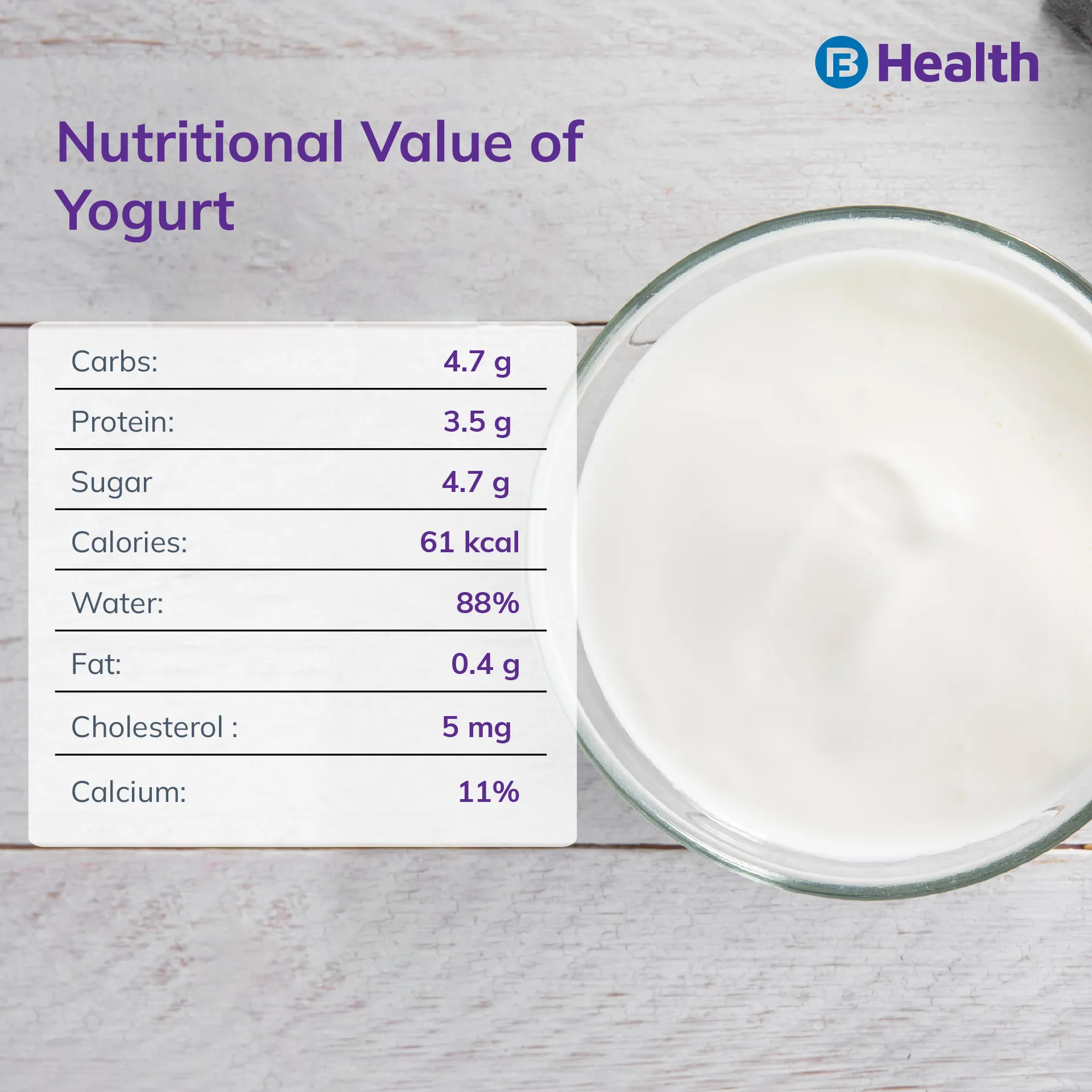General Physician | 7 min read
Yogurt: Nutrition Value, Health Benefits, How to Make it
Medically reviewed by
- Table of Content
Key Takeaways
- The benefits of yogurt come from the bacteria and other nutrients in them
- Improved gut, heart, bone, and skin are common benefits of eating yogurt
- Non-fat and whole fat are two common milk options used to make yogurt
Yogurt, made from fermented milk, has been consumed by people since the time of ancient civilizations. Because of its versatility, yogurt is one of the most popular foods across the world. It can be a dish by itself or you can add it to your recipe for added flavor and texture. The reason for its popularity is the nutritional value and the many benefits of yogurt in the morning you can get.
Yogurt cultures help ferment lactose, natural sugar found in milk. This fermentation process produces lactic acid. It helps curdle the milk proteins and give it a creamy texture. You can make yogurt from various milk options like whole milk (cow milk with fat) or skimmed milk (milk without the cream).
You can also prepare yogurt from milk alternatives like coconut milk, hemp milk and more. Plain, unsweetened yogurt has many benefits when you take it regularly and in proportion. Read on to know about 6 benefits of yogurt you can enjoy.
Is Yogurt The Same As Curds?
Curd and yogurt differ just a little from one another. Both are dairy products produced using processes that are somewhat similar. Lactic acid is produced when bacteria are added to milk to ferment it, giving yogurt its sour flavour and creamy texture. On the other hand, to make curd, milk is treated with acidic ingredients like rennet, vinegar, or lemon juice, which causes the milk to coagulate or curdle.
Yogurt is one of the best options for naturally manufactured probiotics because it contains lactobacillus bacteria as well as some other bacteria. A small number of bacteria can be found in curds, but not as much as in yogurt. Curds can be processed further to create cheese, whereas yogurts cannot.
Both yogurt and curds are offered in their natural state or can be flavored and served as drinks and desserts. Finally, even though yogurt and curd both have lower lactose content, yogurt is preferred by those who are lactose intolerant.[1]
Nutrition Value of Yogurt
Yogurt contains almost all the nutrients needed by your body.
100 grams of unsweetened yogurt contains:
- 61 calories
- 88% of water
- 4.7 g of carbs
- 3.5 g of protein
- 3.3 g of fat
- 100 mg calcium
- 0.8 µg vitamin B12
- 141 mg potassium
- 11 mg magnesium

Protein
Yogurt is a rich protein source. Protein in yogurt is higher than in plain milk due to fermentation. Yogurt contains whey protein and casein, which are both easy to digest and rich in essential amino acids.
Carbs
Plain yogurt mainly consists of simple sugars such as lactose and galactose. The lactose content is much lower than milk as fermentation results in its breakdown.
Fats
The type of milk used determines the amount of fat present in yogurt. It mainly contains saturated fats and a fair amount of monounsaturated fats as well.
Fat in yogurt is unique as it contains as many as 400 different types of fatty acids needed for growth and development. Yogurt also contains ruminant trans fats that are considered beneficial, unlike trans fats in processed foods.
Micronutrients
- Yogurt has a high calcium content, which is essential for strong bones and teeth
- It also contains B vitamins, mainly vitamin B12 and riboflavin, that promote healthy growth
- It also helps supply your daily needs for magnesium, potassium, and phosphorus.
Health Benefits of Yogurt
1. Improves Digestive Health
A boost in your digestive health is one of the common benefits of eating yogurt regularly [1]. It contains live bacteria or probiotics that can be beneficial for your gut health. These bacteria can help reduce the symptoms of lactose intolerance and improves digestion of lactose [2]. Regular consumption of yogurt that has Bifidobacteria can also help relieve IBS symptoms [3]. These bacteria can also help improve your digestive health even if you do not have a digestive condition.
Additional Read: Top Dairy Foods and Health Benefits of Dairy
2. Helps Maintain Bone Health
Consuming yogurt also helps you with an improved bone health. This is because it is a rich source of protein, calcium, vitamin D, phosphorus, and potassium, which are essential nutrients for your bone. These nutrients can help prevent osteoporosis caused by weak bones. People with osteoporosis also have a low bone density which can make you more prone to fractures. Consuming yogurt three time in a day can help you prevent this, and preserve and improve your bone health [4].
3. Strengthens Immune System
Because of the probiotics, one of the benefits of eating yogurt is stronger immunity. Regular consumption can help improve your immune system and protect you from illness. Probiotics can also help ease inflammation that can cause gut problems or viral infections. They can further reduce the period, severity, and frequency of common cold. Minerals like zinc, selenium, and magnesium of yogurt can add to your immunity.
4. Boosts Heart Health
Improvement in cardiac health is another boon of consuming yogurt. Made from various milk options, the fat in yogurt is beneficial to your heart. Saturated fat from whole milk products can increase good cholesterol levels, which can protect your heart health and reduce the risk of a heart condition [5]. Apart from this, yogurt can also help reduce high blood pressure, a major risk factor for heart problem.
5. Promotes Skin Health
Acne is a common skin problem that is mainly caused by issues in your gut. Among the major benefits of eating yogurt, remember its role in improving your gut health which eventually helps keep your skin healthy. One of the common benefits of eating yogurt for skin is moisturization. It also helps dry skin heal naturally. You can make a face pack from yogurt, milk, honey and other ingredients depending on your skin type. This face pack can help exfoliate your skin by removing dead skin cells and clear blemishes.
6. Aids in Weight Loss
There are many properties of yogurt that can help reduce or manage your weight. The high protein content and calcium help increase the levels of hormones that reduce appetite [6]. Other than this, because of its nutrients you can also form better overall eating habits. Regular yogurt consumption can lead to a sharp decrease in your body weight, waist circumference, and body fat. These reasons make eating yogurt for weight loss a healthy option for you.
Additional Read: 7 Healthy Options for Weight Loss
7. Reduces Inflammation
Consuming yogurt every day helps reduce inflammation in the body by strengthening the integrity of the intestinal lining. By supporting this layer of tissue, endotoxins produced by the gut bacteria that cause inflammation can’t enter the bloodstream. Inflammation is responsible for many autoimmune diseases, such as arthritis, cancer, and diabetes.
8. Alleviates Depression
The gut microbiome significantly impacts mental health. Probiotics present in yogurt boost friendly gut bacteria. This helps patients suffering from depression feel better by lowering stress and anxiety.
9. Reduces Cancer Risk
Yogurt is recognized to have anti-carcinogenic characteristics that lower the risk of developing breast, bladder, and colon cancer.
10. Reduces the Risk of Type 2 Diabetes
Regular unsweetened yogurt reduces the risk of developing type 2 diabetes by helping maintain healthy blood sugar levels.
How to Make Yogurt at Home?
- Step one: Heat the milk and turn off the gas just before it reaches a boil. You can use whole milk to make thicker, creamier yogurt
- Step two: Allow the milk to cool
- Step three: When the milk is warm enough to touch, add the yogurt and mix it well. To 1 liter of milk, add about two tablespoons of yogurt
- Step four: Leave the mixture alone in a warm place overnight or for around 6 to 8 hours.
And voila! Your homemade yogurt is ready. You can eat it right away or store it in the refrigerator for later. [1]
Make sure you start your day by consuming yogurt as benefits of yogurt in the morning are plenty. Avoid eating yogurt at night if you have digestive problems as it can impair digestion and lead to constipation. Apart from this, if you have allergies or flu, do not consume yogurt at night because it can lead to mucus production and increase your symptoms further.
Now that you know the benefits of yogurt and when to avoid it, be sure to consume it safely. If you notice any side effects or have signs of illness, contact a doctor immediately. Book an appointment on Bajaj Finserv Health to consult a doctor online from the best practitioners. To resolve your queries, you can book either an online or an in-clinic visit in a matter of minutes. This way, you can stay healthy and get to know your health better!
- References
- https://pharmeasy.in/blog/benefits-of-eating-yogurt-every-day/
- https://pubmed.ncbi.nlm.nih.gov/16022746/
- https://pubmed.ncbi.nlm.nih.gov/17635382/
- https://www.ncbi.nlm.nih.gov/pmc/articles/PMC4703621/
- https://www.ncbi.nlm.nih.gov/pmc/articles/PMC4006120/
- https://pubmed.ncbi.nlm.nih.gov/26175486/
- Disclaimer
Please note that this article is solely meant for informational purposes and Bajaj Finserv Health Limited (“BFHL”) does not shoulder any responsibility of the views/advice/information expressed/given by the writer/reviewer/originator. This article should not be considered as a substitute for any medical advice, diagnosis or treatment. Always consult with your trusted physician/qualified healthcare professional to evaluate your medical condition. The above article has been reviewed by a qualified doctor and BFHL is not responsible for any damages for any information or services provided by any third party.



